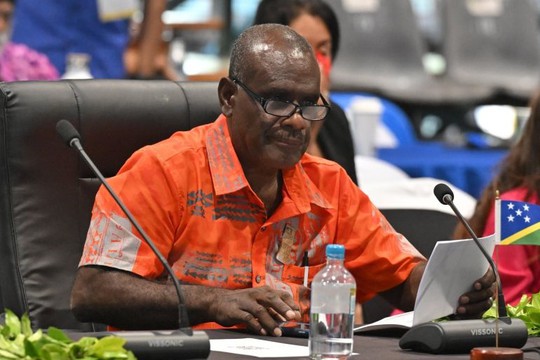Jeremiah Manele at a Pacific Island Forum.
Photo: EPA-EFE
Solomon Islands chooses China-friendly ex-diplomat Jeremiah Manele as new Prime Minister. Move seen as continuation of Pacific country’s policy of growing closer to Beijing, notes ‘The Guardian’.
Solomon Islands lawmakers have elected as their new prime minister Jeremiah Manele, a former foreign minister who has pledged to continue the Pacific country’s policy of embracing China.
The country’s governor, Gen Sir David Vunagi, announced outside parliament house that Manele had won 31 votes, against 18 votes for opposition leader Matthew Wales. The election of the PM was due to be followed by the swearing-in of the parliament, as well as the election of the speaker.
Manele’s appointment comes after a national election last month failed to deliver a majority to any political party. The two camps had lobbied to win support from independents in the 50-member chamber ahead of Thursday’s vote for the prime minister.
A national election in April failed to deliver a majority to any political party, and two camps lobbied to win support from independents ahead of the vote for prime minister.
The withdrawal of pro-Beijing former Prime Minister Manasseh Sogavare from the contest to make way for Manele as their party’s candidate indicated the country could follow a similar direction, writes AP.
Manele was foreign minister in 2019 when Sogavare’s government turned its back on Taiwan and established diplomatic relations with Beijing.
Sogavare had hoped to become the first Solomons Prime Minister to maintain power in consecutive four-year terms following the election. During his previous term, China’s influence increased more in the Solomons than anywhere else in the South Pacific.
Sogavare switched diplomatic recognition from Taiwan to Beijing and struck a secret security pact that has raised fears of the Chinese navy gaining a foothold in the region.
Meg Keen, the director of the Pacific Islands program for Lowy Institute, a Sydney-based international policy think tank, said Manele will be a “less fiery and combative leader for the West to manage but he will continue to pursue close relations with China.”
“As the former foreign minister, he helped broker the security deal with China that panicked the West. But he is also a seasoned diplomat with experience at the U.N. and in Western countries — he’s no stranger to Western engagement,” Keen said.
Manele has pledged a “government of national unity” that would focus on improving the economy and “progress on our road to recovery” after the COVID-19 pandemic. He said bills on a value-added tax, establishing a special economic zone and rules around national resources would be at the top of the new government’s agenda.
Wale, the opposition leader who heads a 20-seat coalition of parties called CARE, said on Wednesday that the government had failed to create jobs, and the economy was dominated by logging and mining companies, which shipped resources to China, while health clinics were unable to obtain basic medications such as paracetamol.
Police had boosted security in the capital, Honiara, as the newly elected lawmakers arrived at parliament on Thursday to conduct the secret ballot.
The election is being closely watched by China, the United States and neighbouring Australia because of the potential impact on regional security after outgoing Prime Minister Manasseh Sogavare struck a security pact with China in 2022.
…China's influence in the Pacific region has strengthened. The United States is loosing the current round of the struggle for the Pacific Ocean.
read more in our Telegram-channel https://t.me/The_International_Affairs

 10:39 03.05.2024 •
10:39 03.05.2024 •























